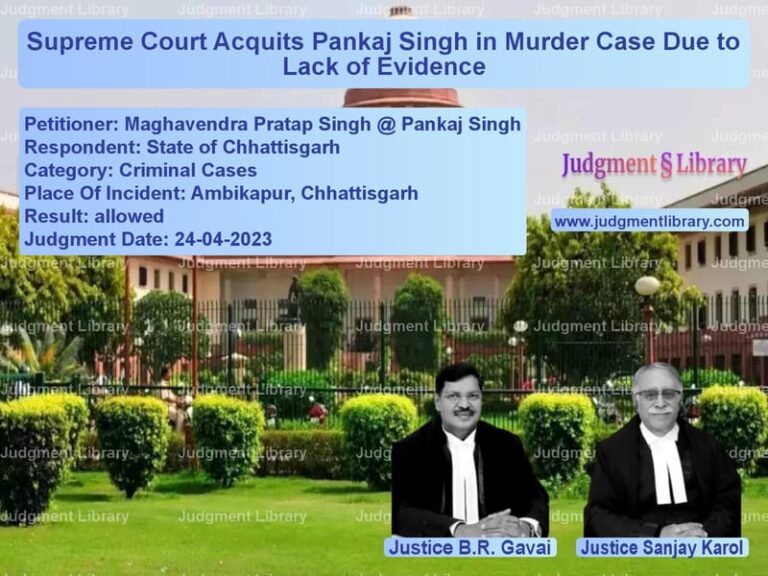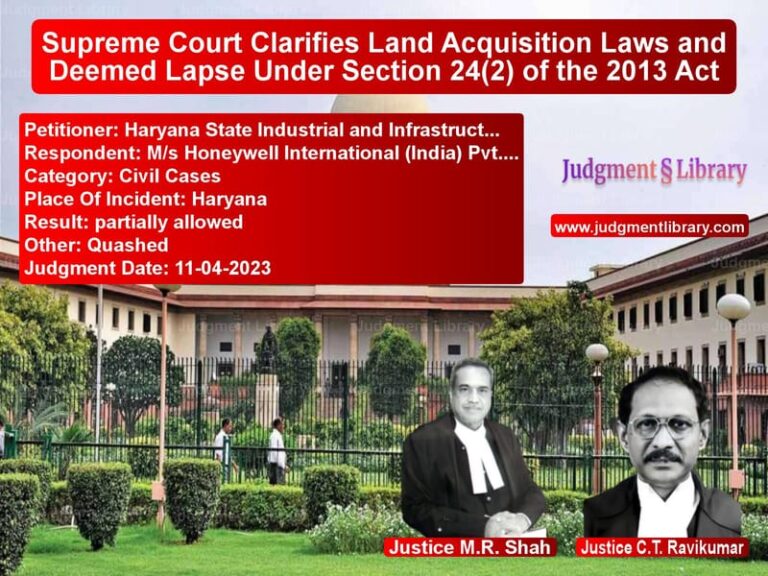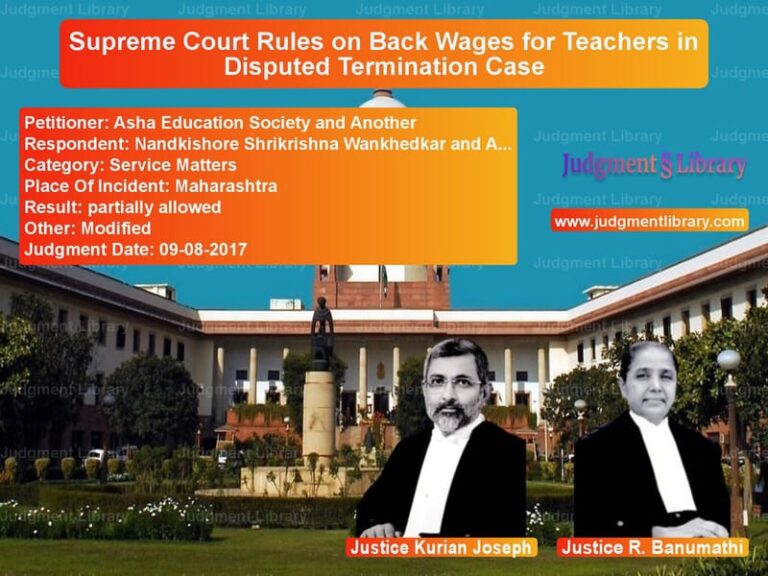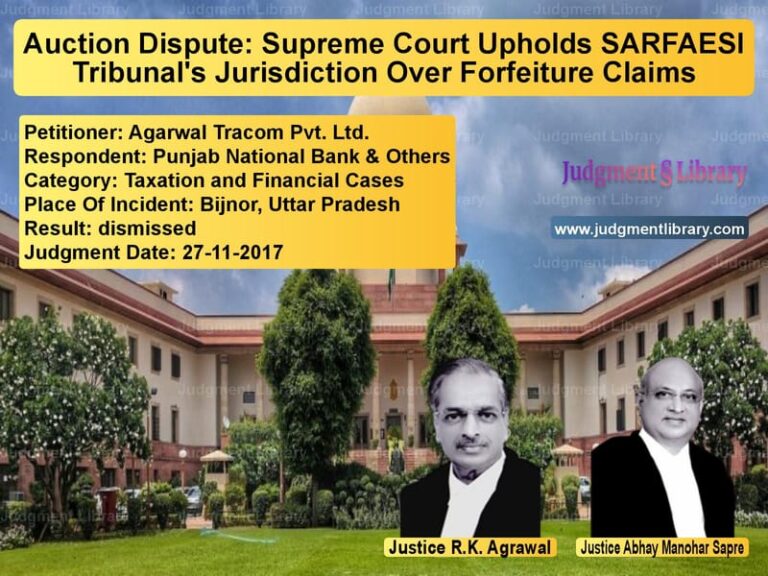Chandrabhan Rupchand Dakale vs. State of Maharashtra: Supreme Court Ruling on Land Ceiling and Property Rights
The case of Chandrabhan Rupchand Dakale vs. State of Maharashtra is a landmark Supreme Court ruling addressing disputes related to land ceiling laws and property rights under the Maharashtra Agricultural Lands (Ceiling on Holdings) Act, 1961. This case raises important legal questions about whether surplus land was lawfully declared and distributed, and whether landlords and tenants had valid claims over the disputed land.
The Supreme Court’s ruling clarifies the interpretation of the Ceiling on Holdings Act, reinforcing principles of land redistribution, protecting landowners’ rights, and ensuring that challenges to land declarations must be raised within the stipulated legal timeframes.
Background of the Case
The dispute arose when the Collector of Ahmednagar declared 1045 acres of land as surplus in 1966, in accordance with the Maharashtra Agricultural Lands (Ceiling on Holdings) Act, 1961. The appellant, Chandrabhan Rupchand Dakale, argued that portions of the declared surplus land had been forcibly taken and should not have been included in his holdings. He contended that some of the land had been transferred to others before the implementation of the Act and should not have been classified as excess.
The case saw multiple legal proceedings before various forums, including the Revenue Tribunal and the Bombay High Court, both of which upheld the Collector’s findings and dismissed the appellant’s claims.
Key Legal Issues
- Was the surplus land correctly determined under the Maharashtra Agricultural Lands (Ceiling on Holdings) Act, 1961?
- Did the appellant have a legal right to challenge the land declaration decades later?
- Were the landlords entitled to claim land under Section 19 of the Act?
- Did past mutation entries and revenue records impact the legality of the land distribution?
Trial Court and High Court Findings
The Collector and Maharashtra Revenue Tribunal upheld the classification of the land as surplus. The Bombay High Court also ruled against the appellant, affirming that the redistribution of surplus land had been lawfully executed under the provisions of the Act.
Arguments by the Appellant
The appellant, Chandrabhan Rupchand Dakale, presented the following arguments:
- The land had been transferred before the Act came into force and should not have been classified as surplus.
- The authorities erred in calculating his total landholding, including properties that had already changed hands.
- Mutation entries showed that some of the land had been in the possession of other individuals, and he should not be held accountable for it.
- The government had wrongly taken possession of land that he and his family had legally owned for generations.
Arguments by the Respondents
The State of Maharashtra, represented by the respondents, countered with the following arguments:
- The appellant had ample opportunity to challenge the surplus land declaration in the past, but he failed to do so.
- The principle of res judicata applied, as the matter had already been decided in earlier proceedings.
- Land ceiling laws were enacted for fair land redistribution, and allowing such belated claims would defeat the purpose of the Act.
- There was no documentary evidence proving that the land had been transferred before the relevant date.
Supreme Court’s Analysis
The Supreme Court examined the validity of the appellant’s claims and considered whether past rulings prevented him from raising the dispute again. The Court referred to key legal precedents to determine:
- Whether the Ceiling on Holdings Act was applied correctly.
- Whether the appellant’s claims were barred by res judicata.
- Whether the land was lawfully redistributed.
The Court emphasized:
“An individual cannot seek to invalidate land redistribution decades after the process has been completed, as this would undermine the objectives of land ceiling laws.”
Final Judgment
The Supreme Court ruled:
- The appellant’s claims were barred under the doctrine of res judicata, as previous proceedings had already settled the matter.
- The redistribution of surplus land remained lawful.
- The landlords’ claims under Section 19 were valid, as they had satisfied the legal criteria for reclaiming their lands.
- The appeal was dismissed, and no further relief was granted to the appellant.
Conclusion
This judgment strengthens the enforcement of land ceiling laws and upholds the principle that challenges to land declarations must be raised within legal timeframes. It ensures that disputes over surplus land are not reopened years after distribution, maintaining legal certainty and upholding the objectives of land redistribution laws.
Petitioner Name: Chandrabhan Rupchand Dakale.Respondent Name: State of Maharashtra & Ors..Judgment By: Justice C.T. Ravikumar, Justice Sanjay Kumar.Place Of Incident: Maharashtra.Judgment Date: 18-12-2024.
Don’t miss out on the full details! Download the complete judgment in PDF format below and gain valuable insights instantly!
Download Judgment: chandrabhan-rupchand-vs-state-of-maharashtra-supreme-court-of-india-judgment-dated-18-12-2024.pdf
Directly Download Judgment: Directly download this Judgment
See all petitions in Property Disputes
See all petitions in Succession and Wills
See all petitions in Contract Disputes
See all petitions in Judgment by C.T. Ravikumar
See all petitions in Judgment by Sanjay Kumar
See all petitions in dismissed
See all petitions in supreme court of India judgments December 2024
See all petitions in 2024 judgments
See all posts in Civil Cases Category
See all allowed petitions in Civil Cases Category
See all Dismissed petitions in Civil Cases Category
See all partially allowed petitions in Civil Cases Category







